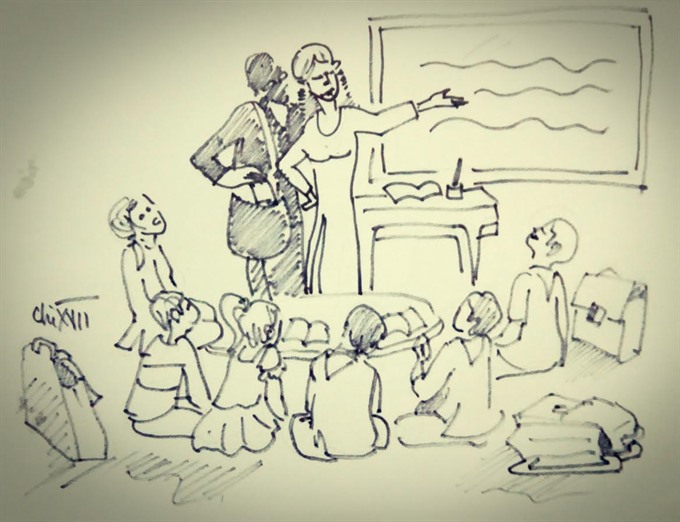 Talk Around Town
Talk Around Town

I strongly believe, as a mother of a four-year-old girl, that we should not force formal learning on them at a tender age.
 |
Khánh Linh
I strongly believe, as a mother of a four-year-old girl, that we should not force formal learning on them at a tender age.
We cannot rob our children of a fun-filled, carefree childhood away in the name of getting them ready for the academic rigors of the primary school. This is beyond dispute, right?
The Education Ministry agrees with me, too. Four years ago, it banned the teaching of learning and writing in pre-school institutions.
Looking at parents rushing about to find private classes – all of them illegal – to teach their four and five-year-old kids reading, writing and math, and forcing them to do homework, I told myself, “Not me! Not my kid!”
This was the case until two weeks ago, when my assumptions and beliefs were shaken to the core.
Tô Minh Trang, a friend and a like-minded parent, was also one of the ‘brave’ mothers to keep her son out of the extra classes until he was six.
His first days as a first-grader were almost traumatic for both child and mother.
The boy was the only child in class who couldn’t read or write. He was ridiculed constantly by classmates every time he made mistakes. Worse, the teacher told Trang that her son was lagging behind normal standards.
Not surprisingly, the child did not take kindly to this experience.
“He kept telling me that he didn’t like school. I could feel his stress and shame for not performing well as his peers”, she said.
The first semester was quite a struggle for both Trang and her son. After a long tiring day at school, he was pushed to practise reading, writing, spelling and basic numerals so that the could catch up with other classmates.
“My son does not have a learning disability. He just did not join early class,” she said, in a mixture of anger and pain.
Trang’s experience has been a painful lesson for me. I have since been astonished to find out that all of my friends – some working in primary education – are about to enroll their kids in what can be called “early start” classes.
Nguyễn Huyền Vân, a former primary school teacher in Cầu Giấy District, said that after considering both pros and cons, she had decided to teach her five-year-old son at home before he joined primary school.
“The learning pressure will be a lot easier if the child knows a little. If the teacher finishes lessons at a rapid pace, he won’t find it difficult to understand,” she said.
Vân said teaching and learning quality at primary schools was part of the problem. Most public schools have between 50-60 students per class against the standard of 35-40, thus teachers cannot afford individual attention to all of them.
Nguyễn Phương Linh, staff of a primary school in Ba Đình District, said the theory behind banning rigorous pre-school teaching was right, but applying it in practice was difficult.
“Moving from pre-school to primary school is a very important transition that needs to be managed well. I agree that some parents are sending kids to private tutors before entering first grade, so that they get good marks. But many others only want their children to get acquainted with a new studying environment,” she said.
In fact, pre-school children don’t know much about primary schools, and orientation lasts just one or two days after enrolment. This was not enough, Linh added.
The actual situation is why parents have largely ignored the Education Ministry’s ban as well as reminders that officials repeat every summer about not teaching reading and writing in pre-schools. Invariably, the press reports about these classes despite the ministry saying it will intensify supervision.
Horns of a dilemma
I am pulled in two directions now. Part of me wants to nourish my daughter’s eagerness to learn basic writing and reading skills, maybe even more; and she would find places that teach this comfortable. But the other part does not want her to feel anxious or stressed about not performing well enough.
But this much is certain. I don’t want her to be tagged by teachers just because she doesn’t know how to write or read before entering the first grade.
As a very concerned parent, I think it’s time the ministry lifts the largely ineffective ban on teaching of writing and reading.
It’s also time that primary schools are allowed to open pre-elementary classes, so that parents can send their five-year-old children to prepare for the first grade instead of entrusting private businesses of unknown pedagogical quality with the task.
These classes should help children get familiar with formal schooling, and the curriculum can deploy a play-based approach that imparts self-confidence, energy and enthusiasm to speak their mind.
Principals of the primary schools should take responsibility for the quality of such classes.
But parents should stop expecting and pushing their kids to be the best in the classes and pressurizing them to cram knowledge that they will get in school, anyway.
Children should enjoy going to school everyday. Childhood does not end after pre-school. It continues throughout the primary school, which should be a fun, memorable experience even as they learn the basic skills of reading, writing and counting.
Pressurising children to pass with high marks with extra work means parents are failing in their fundamental duty of providing their wards with a tension-free childhood. – VNS




